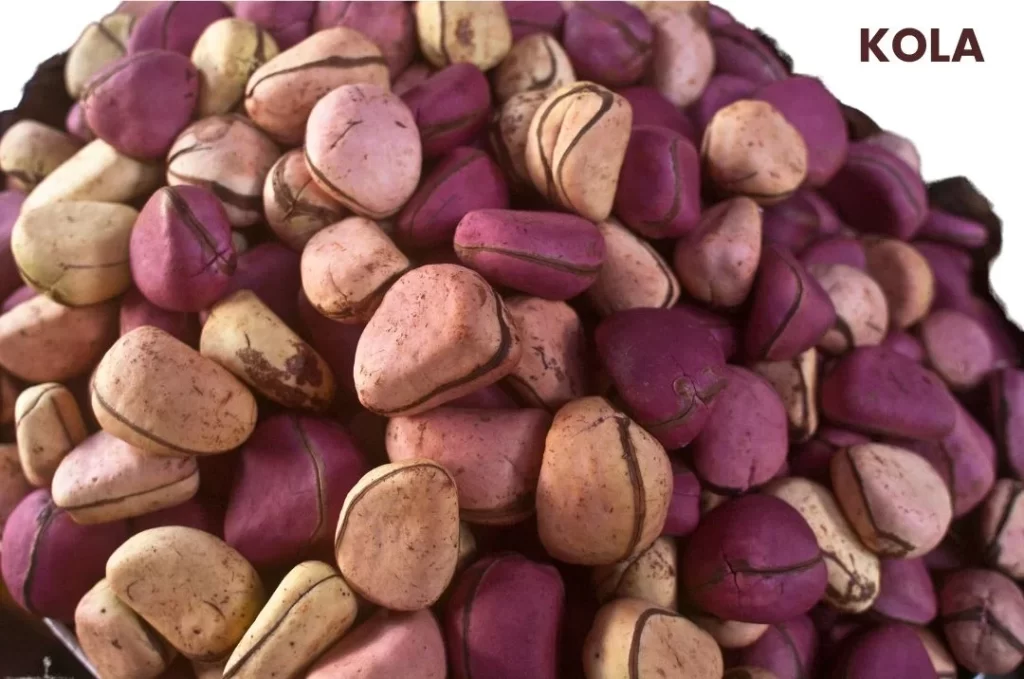Kola, derived from the Kola-nut (Sterculia), is a multifaceted remedy in homeopathy, renowned for its tonic and anti-diarrheic properties.
It is particularly effective in treating neurasthenia, regulating cardiac rhythm, and acting as a diuretic.
Kola is also known for its unique ability to reduce cravings for alcohol, making it beneficial for individuals dealing with drinking habits.
Additionally, it helps improve appetite and digestion and provides endurance during prolonged physical exertion.

Table of Contents
ToggleSOURCE INFORMATION
Scientific Classification
- Family: Malvaceae
- Genus: Cola
- Species: C. acuminata, C. nitida
Origin
- Kola trees are native to the tropical rainforests of Africa.
- The seeds, known as Kola-nuts, are commonly used in West African cultures for their stimulating properties and as a traditional remedy for various ailments.
Historical Facts
- Traditional Use: In West Africa, Kola-nuts have been used for centuries as a stimulant, social drink, and remedy for digestive issues.
- They are often chewed during ceremonies and social gatherings.
- Introduction to Homeopathy: Kola was introduced into homeopathic medicine for its broad spectrum of benefits, particularly its impact on the nervous and cardiovascular systems.
DRUG PATHOGENESIS
Kola primarily affects the nervous and cardiovascular systems.
It is known to enhance physical endurance, regulate heart rhythm, improve appetite, and reduce alcohol cravings.
Additionally, it acts as a tonic and diuretic, promoting overall well-being.
KEY CHARACTERISTICS
Neurasthenia
- Mental Fatigue: Reduces mental exhaustion and improves cognitive function.
- Physical Fatigue: Increases physical endurance and reduces the feeling of tiredness.
Cardiovascular System
- Regulates Cardiac Rhythm: Helps in maintaining a regular heartbeat.
- Weak Heart: Provides strength to a weakened heart and improves circulation.
Digestive System
- Improves Appetite: Stimulates appetite and aids in digestion.
- Anti-Diarrheic: Helps in managing diarrhea and promoting healthy bowel movements.
Respiratory System
- Asthma: Provides relief from asthmatic symptoms and improves breathing.
Drinking Habit
- Reduces Craving for Liquor: Lessens the desire for alcohol, aiding in overcoming drinking habits.
DETAILED ORGAN SYMPTOMS
NERVOUS SYSTEM
- Neurasthenia: Characterized by mental and physical exhaustion, often accompanied by irritability and lack of concentration.
- Kola helps in reducing these symptoms and improves overall vitality.
CARDIOVASCULAR SYSTEM
- Weak Heart: Individuals with a weak heart often experience fatigue, shortness of breath, and irregular heartbeat.
- Kola helps in strengthening the heart and regulating its rhythm.
- Regulates Circulation: Improves blood flow and reduces symptoms related to poor circulation, such as cold extremities and dizziness.
DIGESTIVE SYSTEM
- Improves Appetite: Kola stimulates the appetite, making it beneficial for individuals with poor dietary intake or anorexia.
- Anti-Diarrheic: Manages diarrhea by promoting proper bowel function and reducing intestinal inflammation.
RESPIRATORY SYSTEM
- Asthma: Provides relief from asthmatic symptoms, such as wheezing, shortness of breath, and chest tightness.
DRINKING HABIT
- Reduces Alcohol Craving: Kola is effective in reducing the desire for alcohol, making it a supportive remedy for individuals trying to overcome drinking habits.
MODALITIES
- Better: Symptoms improve with increased physical activity and consumption of Kola-nut.
- Worse: Symptoms worsen with mental and physical exhaustion, and excessive consumption of stimulants.
RELATIONSHIP WITH OTHER DRUGS
Compare:
- Coca: Known for its stimulating properties and effectiveness in managing fatigue and improving physical endurance.
DOSE
Recommended Dosage:
- Tincture: Three to ten drops, three times a day.
- High Dose: Up to one dram, three times a day.
Frequently Asked Questions
What conditions can Kola treat?
- Kola is used to treat neurasthenia, weak heart, poor appetite, diarrhea, asthma, and to reduce alcohol cravings.
How is Kola administered?
- Kola is typically administered as a tincture in doses ranging from three to ten drops, up to one dram, three times a day.
Are there any side effects of Kola?
- When used in recommended doses, side effects are rare. However, excessive consumption may lead to overstimulation and insomnia.
Can Kola be used to improve physical endurance?
- Yes, Kola is known for its ability to enhance physical endurance and reduce fatigue, making it beneficial for individuals engaged in prolonged physical activities.
Meaning of Difficult Words
- Neurasthenia: A condition characterized by physical and mental exhaustion, often accompanied by irritability and lack of concentration.
- Diuretic: A substance that promotes the production of urine, helping to eliminate excess fluids from the body.
- Strangury: Painful, frequent urination of small amounts of urine.
- Ischuria: Suppression or retention of urine.
- Lithiasis: The formation of stones (calculi) in the body, commonly in the kidneys or urinary bladder.
- Hyperaemia: An excess of blood in the vessels supplying an organ or other parts of the body.
- Pyelitis: Inflammation of the renal pelvis, often due to a bacterial infection.
Kola is a versatile homeopathic remedy that offers numerous benefits for mental and physical well-being, making it a valuable addition to the homeopathic pharmacopeia.
